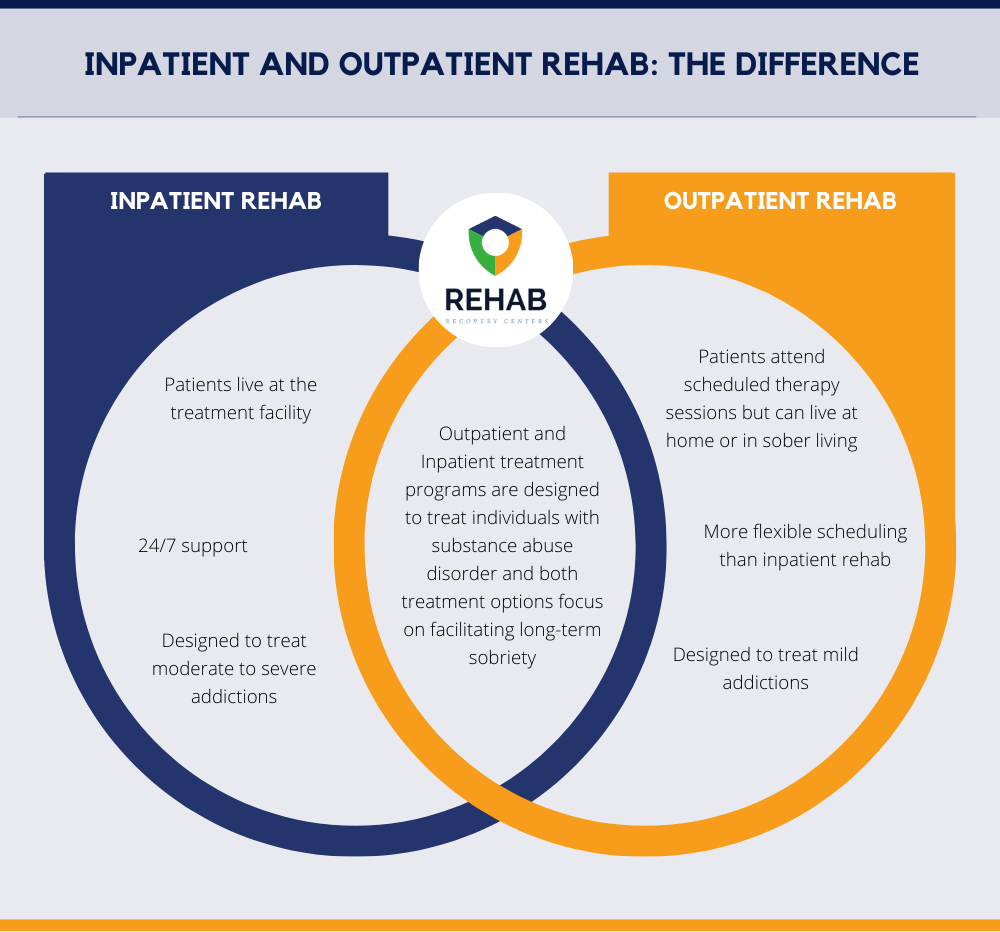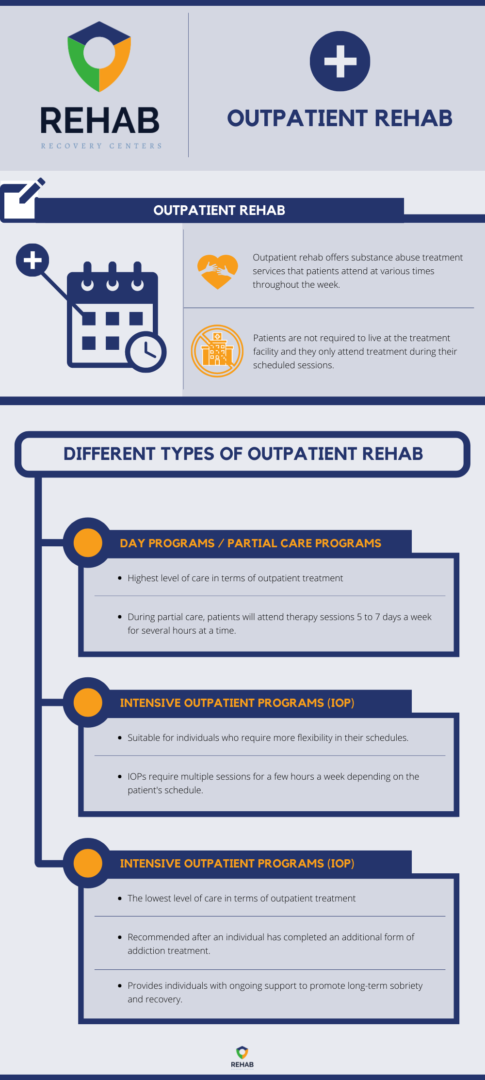Table of Contents
Deciding to end your tumultuous relationship with drugs and alcohol is an essential first step towards recovery. However, recovery is a process that requires the aid of a drug and alcohol treatment center. There are many different forms of substance abuse treatment, including detox, therapy, and counseling. These forms of treatment may be provided in two different methods: inpatient and outpatient rehab.
An individual’s specific needs and severity of their substance abuse issue will determine which method of addiction treatment they require. Both inpatient or outpatient rehab helps individuals to recover from the causes and effects of addiction. Also, neither form of treatment program is considered to be more effective than the other. However, the setting, length of stay, and program requirements differ in nature, meaning one program may be more well-suited for an individual.

Inpatient Rehab
Inpatient rehab, also known as residential treatment, requires patients to live at the rehab facility. Typically, inpatient rehab is recommended to individuals who suffer from moderate to severe addictions as well as people who may suffer from co-occurring mental health conditions. When individuals live on-campus they are better able to avoid substance abuse temptations and triggers in their daily lives. In other words, living at a residential addiction treatment facility allows patients to be in a healthy environment that supports their recovery.
Licensed and professional inpatient recovery centers offer 24-hour medical support, intensive care, and mental health aid. Also, inpatient programs incorporate three phases of recovery into their treatment plans: detox, self-reflection, and growth. In doing so, these programs are able to help patients learn how to live a drug- and alcohol-free lifestyle after completing treatment. Additionally, many of these programs provide aftercare services that help patients transition from residential treatment to individual or group therapy outside of the facility.
Lastly, there are both short- and long-term program options. During a long-term residential program, patients typically undergo treatment from six months to a year. On the other hand, short-term residential facilities might only require a stay of three to six weeks.
Things to Consider Before Choosing Inpatient Treatment
Inpatient treatment offers several benefits that may not be available during an outpatient program.
The benefits of inpatient treatment include:
- Both short-term and long-term options are available, allowing individuals to decide for themselves how long they need to attend treatment.
- Residential facilities provide 24/7 care. This means patients will never be left alone to deal with the effects of their addiction.
- Treatment is highly structured in the inpatient setting, focusing on all aspects of addiction. This may include social factors, such as building relationships and lifestyle skills. Also, this form of treatment addresses psychological factors that are related to your personal history and situation.
- Safe housing and medical attention are provided 24-hours a day. This is especially beneficial for patients who deal with severe problems that may be complicated by other mental health conditions or disorders.
While residential rehab provides many benefits, it also requires a larger commitment than outpatient programs do. Some things to keep in mind while deciding between inpatient and outpatient rehab are:
- Inpatient rehab requires you to separate from your daily life. Oftentimes, this means taking a break from work, school, or any other obligations you may have.
- Treatment is highly structured and may be challenging. The treatment schedule will be decided for you by the staff. Sometimes the rigid and intense nature of inpatient treatment becomes difficult.
- Costs are often higher for inpatient rehab compared to outpatient rehab. However, it’s important to remember that the cost of treatment is always less than the cost of addiction. Also, there are payment options such as insurance, scholarships, or sliding-scale payment plans.
Outpatient Rehab
Unlike inpatient treatment, outpatient programs allow patients to reside at home while receiving treatment for their substance abuse issues. Typically, outpatient rehab is recommended for individuals with mild addictions and people who can motivate themselves to continue treatment. Additionally, individuals who cannot neglect certain responsibilities such as caring for children, keeping up with a career, or attending school can benefit from outpatient. Since patients do not live on-site and the program is not as intensive, the cost of outpatient treatment is less than that of inpatient rehab programs.
Outpatient rehab provides an array of treatments such as therapy, counseling, or group sessions, at the clinic or facility. Most outpatient programs involve individual or group counseling and use a step-down approach, meaning sessions become less intense and frequent over time.

Things to Consider Before Attending Outpatient Treatment
There are several benefits associated with outpatient treatment that make this form of substance abuse recovery more beneficial for certain people.
These benefits may include:
- Patients live at home while receiving treatment. This works if your family and friends are your support system. Also, this is beneficial for individuals with responsibilities they must uphold.
- The cost of treatment is much lower for outpatient care when compared to inpatient care.
- There are many different types of therapy offered in this setting. Also, you can choose the level of intensity of care that works best for you.
- Appointments are flexible, as they may be made in the evenings or on weekends to accommodate work or childcare schedules.
- Some outpatient programs may treat patients with co-occurring problems or disorders, such as depression, eating disorders, bipolar disorder, or post-traumatic stress disorder.
If you identify with any of the following statements, outpatient rehab might not be the best option for you:
- You experience frequent urges to use or have suffered from relapses in the past.
- It is difficult for you to motivate yourself to attend group and individual sessions on time.
- You need treatment for co-occurring disorders or require medical care.
Attend an Addiction Treatment Program Near You
No matter what type of drug or alcohol rehab you choose, both forms of treatment can provide you with the tools you need to achieve life-long sobriety. Both inpatient and outpatient options help you detox, alter your perceptions and attitudes concerning substances, and allow you to prepare for the real world. Also, both options provide patients with the skills needed to continue recovery after rehab.
With that being said, Rehab Recovery Centers is here to help you find the best outpatient or inpatient rehab in your state. Contact us today for more information on how to get started.
Get Help Today
Don’t go through the process of recovery alone. There are people who can help you with the struggle you’re facing. Get in touch with one today.


